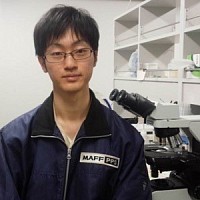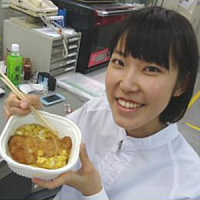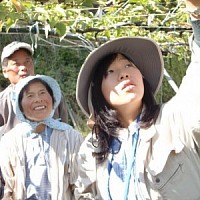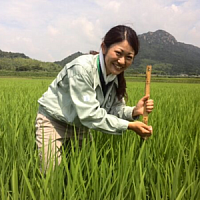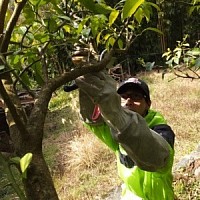Career Paths of Graduates
Mr. YORITOMI, Ryosuke (Shueisha Publishing Co., Ltd., Weekly Shonen Jump Editorial Department)
[Master's degree completed in 2015, undergraduate degree in 2013]
Mr. NAGASE, Toyohiro (Asahi Soft Drinks Co., Ltd. Metropolitan Branch)
[Master's degree completed in 2015, undergraduate degree in 2013]
[Current job description] Sales activities to sell beverages to mass retailers. [Research topic during student days] "Studies on the production of tetraploids of peach, Japanese plum and their intersubgeneric hybrids" In the horticulture laboratory, we worked on creating a new species of fruit by creating polyploid hybrids between peach and Japanese plum. [Good things I learned and what I gained from studying at the horticulture laboratory] I currently work for a beverage company, and I feel that I can utilize my knowledge of vegetables and fruits, as well as the logical thinking I have acquired through my research activities, in my work. I would like to eventually work in the marketing department, where I will be involved in the development of beverages that make use of the natural flavors of fruit. [Message to students interested in the Horticulture Laboratory] I have loved fruit since I was a child, and in particular I wanted to create new varieties of fruit, so I joined the Horticulture Laboratory. I believe that the Horticulture Laboratory is the only place where you can get involved with a wide range of crops, including flowers, vegetables, and fruits, so I recommend it to anyone who wants to study a wide range of crops. In the Horticulture Laboratory, you can experience both experiments in the lab and field work, so I think you will enjoy working on your research. If you love horticultural crops, I recommend you to join the Horticulture Laboratory and spend a fulfilling university life.
Mr. SAKAGUCHI, Teppei (Ministry of Agriculture, Forestry and Fisheries, Plant Protection Station, Narita Branch)
[2014 Undergraduate Graduate]
[Current job description] I currently work at Narita Airport, where I am responsible for the quarantine of many plants imported from overseas. I mainly inspect fresh produce such as vegetables and fruits. [Research topic during student days] My research theme was "Low height flowering of Actinidia genus plants." Throughout the year, I mainly conducted growth surveys of Actinidia plants such as wild pears and kiwifruit. [Good things I learned and what I gained from studying at the horticulture laboratory] The Horticulture Lab holds literature seminars every week and introduces interesting research papers. Since these overseas papers are all in English, it sometimes took me more than a few weeks to translate them all, as I am not good at English. However, there are many international students in the Horticulture Lab, and with their help, I gradually got used to English. I have many opportunities to use English in my current job, so it was great to have been able to improve my English skills at the lab. [Message to students interested in the Horticulture Laboratory] I think the biggest feature of the Horticulture Lab is that we handle a much larger number of plants than other labs. Of course, the plants you can use in your own research will be limited, but you will have many opportunities to come into contact with flowers, vegetables, and fruit trees through seminars and literature, so you should be able to learn about horticulture in general. If you're interested in at least one of "flowers," "vegetables," or "fruit," please come and visit our lab.
Ms. KOSAZA, Masako (Kumamoto Flour Milling Co., Ltd., Research and Development Department, Frozen Foods Group)
[Master's degree completed in 2012, undergraduate degree in 2010]
[Current job description] Product development and basic research into mixed flours for deep-frying (tempura flour, fried chicken flour) (*The photo shows me eating a katsudon (pork cutlet rice bowl) made with a product I developed.) [Research topic during student days] "Study on polyploidy and sex of asparagus" [Good things I learned and what I gained from studying at the horticulture laboratory] I was originally interested in plant research and fieldwork, so I chose the horticulture lab. Asparagus, which I used as a research material, was grown on the affiliated farm, and I would visit almost daily during the spring breeding season. The experiments were diverse, including genetic analysis and cultivation, and I was able to learn about a wide range of fields. Although some experiments did not go well, I was able to continue until the end thanks to the support of my professors and the support of my lab colleagues. My experience in the horticulture lab and my tenacious attitude are still useful in my work, even now that I am a working adult. [Message to students interested in the Horticulture Laboratory] I believe that university is a place where you have plenty of time and opportunities to try things you like and are interested in. Don't be afraid of failure when it comes to things that interest you, take on new challenges and gain as much experience as you can. I believe that these experiences will be useful even after you enter society. In the horticulture lab, there is a wide range of research subjects, including flowers, fruit trees, and vegetables, and the experimental content is diverse, from the genetic level to field work, so I think it is the perfect place for those who want to learn about a wide range of fields. University is also a place to meet respected professors and trustworthy peers. Cherish your experiences and encounters, and live a fulfilling university life without regrets.
Ms. OSHIMA, Hisae (Agriculture Department, Shimonoseki Agriculture and Forestry Office, Yamaguchi Prefecture)
[Master's degree completed in 2012, undergraduate degree in 2010]
[Current job description] As a Yamaguchi prefecture employee (agricultural position), I am involved in promoting agriculture in the fruit-producing areas of Shimonoseki. [Research topic during student days] "Studies on the production of tetraploids of peach, Japanese plum and their intersubgeneric hybrids" [Good things I learned and what I gained from studying at the horticulture laboratory] I didn't realize this while I was in school, but once you enter society, you often have to produce results and make decisions in a short period of time, and you have fewer opportunities to think about things over a long span of time. By researching a theme that requires a long period of time, such as fruit breeding, I realized that solving the problems in front of me will have an impact on the future decades from now. Thanks to that, I was able to think about my position and what my work should be like from a bird's eye view, and I think I can work positively with goals in mind. I believe that I was able to encounter this research topic because I was in a horticulture laboratory that has access to orchards and farms. Although I devoted myself to the research, I did not achieve any notable results, but I feel that I learned a lot and grew as a person. [Message to students interested in the Horticulture Laboratory] The reason I chose the Horticulture Laboratory is because I love fruit and I was attracted to the lecture "General Introduction to Horticulture" and wanted to be supervised by this professor. Why not choose a laboratory based on your own interests?
Ms. MIYAZAKI, Riko (Yamaguchi Prefecture, Yamaguchi Agricultural and Forestry Office, Agriculture Department)
[2012 Undergraduate Graduate]
[Current job description] Guidance on agricultural production sites, support for agricultural workers, etc. [Student research topic] "Citrus cultivars containing the self-incompatibility genes S4 andS5 and their relationships" [Good things I learned and what I gained from studying at the horticulture laboratory] Citrus research fields are not only conducted in laboratories, but also in a variety of locations, including vast orchards and greenhouses for managing seedlings. Experiments are by no means easy and require steady effort, but it is fun just to carefully observe the plant bodies that change little by little in each environment, and sometimes we make surprising discoveries, so we never get bored. Naturally, the results vary, with some bringing about important realizations and others resulting in no results at all. However, I feel that I have at least acquired the ability to persevere while finding enjoyment in my own way. [Message to students interested in the Horticulture Laboratory] When I was choosing my lab, I was honestly interested in many different fields and it was quite difficult. However, the reasons I ultimately chose the Horticulture lab were: (1) I love (eating) citrus fruits, (2) the professors and senior students in the Horticulture lab were all very interesting people, and (3) I somehow felt like the atmosphere of the lab suited me. It is of course important to be interested in the research topic, but I think choosing a lab is an extremely important point in terms of finding friends to spend your precious student days with. If you came to the horticulture room and felt something clicked with you, surely you would be perfect to be a horticulture friend... right?! Looking back now, I realize that I was right in trusting my intuition at the time.
Mr. TANIMOTO, Yu (Kochi Prefectural Agricultural Technology Center Fruit Tree Experiment Station)
[2009 Undergraduate Graduate]
[Current job description] Research and testing on breeding, cultivation and quality preservation of citrus fruits, mainly yuzu [Student research topic] "Studies on juvenile flowering and male sterility in citrus trees" [Good things I learned and what I gained from studying at the horticulture laboratory] My current job is conducting research on fruit trees, so I can directly use the knowledge and skills I gained at university in my daily work. I have also learned a lot from the research attitudes (enthusiasm, curiosity, tenacity, etc.) of my professors, seniors, classmates, and juniors in the lab, and these have been of great help to me in my later life. [Message to students interested in the Horticulture Laboratory] The Horticulture Laboratory conducts a wide range of research, including cultivation tests and analytical research on vegetables, fruit trees, and flowers, so I think it's a great laboratory for academic exploration and broadening the scope of your knowledge. Depending on the topic, there are also surveys on farms and orchards, so if you enjoy fieldwork, this is the place for you. There are also great teachers and seniors, so if there's a topic that you'd like to work on, why not go ahead and show it off?



